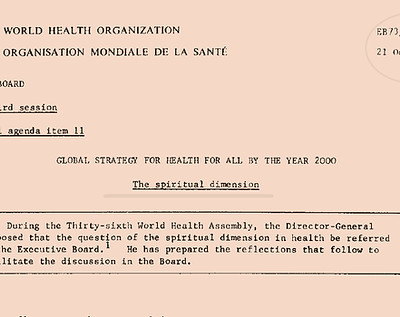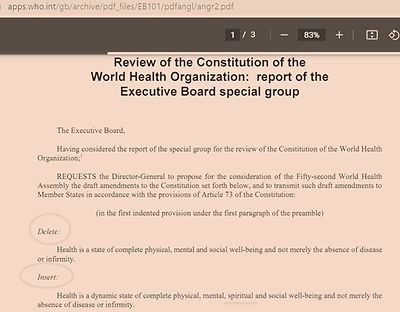
Official Website of
Hifzul Rahman Kottangodan PhD, CHLC, CPI
Spiritual Health and World Health Organization


The Role of Spirituality in Health and Well-being: A Holistic Perspective Based on WHO Insights Introduction Health is not merely the absence of disease but a state of complete physical, mental, social, and spiritual well-being. This holistic definition has been increasingly recognized by the World Health Organization (WHO), which has acknowledged spirituality as a key factor in quality of life and healthcare. Over the past few decades, WHO has made several advancements in recognizing spirituality, religiousness, and personal beliefs as essential aspects of health and well-being.
Chronological Development of WHO’s Recognition of Spirituality in HealthWorld Health Day 1981 – ‘Health for All by 2000’WHO’s commitment to holistic health was evident in its 1981 theme, emphasizing that health must go beyond the physical dimension to ensure true well-being. This early initiative recognized the limitations of a purely biomedical approach.


After the Alma-Ata Declaration of 1978, which emphasized primary health care as the foundation for achieving "Health for All," several Muslim-majority countries urged the World Health Organization (WHO) to incorporate spirituality into its definition of health. These nations recognized that health extends beyond physical, mental, and social well-being to include a spiritual dimension. They argued that faith, values, and a sense of purpose are essential components of holistic health, particularly in societies where religious beliefs play a central role in coping mechanisms, mental resilience, and overall well-being. By integrating spirituality into the concept of health, they sought to ensure a more comprehensive approach to healing and wellness.
In response, countries such as Bahrain, Saudi Arabia, Oman, and Qatar submitted a draft resolution to the WHO during the Thirty-sixth World Health Assembly in 1983. The resolution affirmed the significance of spirituality in health care and called on the WHO Director-General to incorporate this dimension into the development of primary health care programs. This effort reflected a broader understanding of human well-being, recognizing the interconnectedness of body, mind, and spirit in achieving optimal health outcomes. By advocating for the inclusion of spirituality, these nations reinforced the idea that true health must address not only biological and psychological needs but also the deeper spiritual aspects that contribute to a person’s overall sense of well-being.



Despite multiple proposals to include spirituality in the World Health Organization (WHO) Constitution's definition of health, the definition has remained unchanged due to several key reasons. However, WHO has indirectly recognized spirituality’s role in well-being through other frameworks, particularly in its Quality of Life (QOL) assessment and Six Dimensions of Health.
1. WHO’s Alternative Approach: Quality of Life (QOL) and Six Dimensions of Health. Instead of modifying its constitutional definition of health, WHO introduced the Quality of Life (QOL) framework, which explicitly includes spiritual well-being as one of the core components of overall health. WHO also recognized six dimensions of health, which are physical, mental, emotional, social, environmental, and spiritual—showing a broader understanding of well-being beyond the original definition. These frameworks allow spirituality to be integrated into health policies and programs without requiring constitutional amendments.
2. Difficulty in Defining Spirituality in a Global Context Spirituality varies widely across cultures, religions, and belief systems. Some consider it religious faith, while others define it as personal meaning, mindfulness, or existential well-being. Due to the lack of a universally accepted, measurable definition, the WHO has opted to acknowledge spirituality through policy frameworks rather than a formal definition change.
3. Scientific and Secular Concerns. The WHO follows an evidence-based approach, and spirituality is not easily quantifiable or standardized like physical and mental health. Some secular nations have opposed the inclusion of spirituality in the constitutional definition, fearing it could introduce religious influences in global health policies.
4. Political and Bureaucratic Challenges. Changing the WHO Constitution requires a global consensus among 194 member states. While Muslim-majority and faith-based societies strongly supported the change, others resisted, arguing that health should remain a scientific and secular matter. Bureaucratic obstacles have further delayed any attempts to amend the definition.
5. WHO’s Practical Implementation of Spiritual Well-Being. Although the definition remains unchanged, WHO has integrated spiritual health into various health programs, particularly in: Palliative care and end-of-life treatment Mental health frameworks addressing existential well-being. Psychosocial rehabilitation and holistic healing approaches This approach allows WHO to promote spiritual well-being without formalizing it in the Constitution.















Conclusion While WHO has not officially changed its definition of health to include spirituality, it has recognized its significance through the QOL assessment, Six Dimensions of Health, and various health programs. The challenges in defining spirituality universally, along with political, scientific, and bureaucratic hurdles, have prevented a formal constitutional amendment. Instead, spirituality is now integrated into health policies, quality-of-life measures, and holistic care frameworks worldwide.
As a Spiritual Healer, Holistic Life Coach, and Counselor, my approach aligns closely with WHO's perspective. Addressing spiritual health alongside psychological and physical health enhances resilience, emotional well-being, and recovery from trauma. This article explores WHO's recognition of spirituality in health, integrates professional insights, and discusses how these principles can be applied in holistic healing and counseling.











